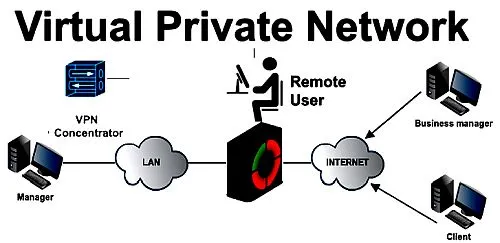VPN: Virtual Private Network
A Virtual Private Network (VPN) is a tool designed to establish a safe and encrypted link between your device and a distant server. Think of it as a personal, secure pathway through the busy internet. This pathway safeguards your online activity, protecting your privacy and enhancing your security by keeping unwanted eyes away.
How Does a Virtual Private Network Work?
When you use a VPN server, your internet data is encrypted, converting it into a coded format that cannot be understood without the appropriate decryption key. This process functions like placing your information in a secure vault, ensuring it remains protected from unauthorized access.
A VPN not only encrypts your data but also conceals your IP address by substituting it with the IP address of the VPN server. This masking method disguises your actual location, making it challenging for others to monitor your online behavior.
Your encrypted data moves through a protected tunnel to the internet and returns securely to your device. This process keeps your online activities private, even when connected to public Wi-Fi or browsing from various locations.
Why Use a Virtual Private Network?
VPNs provide numerous advantages for both personal and professional use.
For individuals, VPNs enhance privacy and security by safeguarding sensitive information from hackers and eavesdroppers, especially when connected to public Wi-Fi. They also enable users to bypass geographic restrictions, granting access to content that may be unavailable in certain regions.
For businesses, VPNs facilitate secure remote access to corporate networks and resources. This allows employees to work from anywhere while maintaining a protected connection to the company’s systems, which is essential for organizations with remote teams or those handling confidential data.
Types of Virtual Private Network
VPNs can generally be categorized into two main types:
-
Personal Virtual Private Network:
Tailored for individual users to ensure their online privacy and security.
Provide features such as robust encryption, IP address masking, and secure internet connections.
Perfect for everyday internet users, frequent travelers, and anyone who prioritizes protecting their online privacy.
-
Remote Access Virtual Private Network:
Commonly utilized by businesses to enable employees to access company networks securely from remote locations.
Offer secure connectivity to company resources, centralized control, and advanced security features.
Crucial for organizations with remote teams or those needing to protect sensitive information while ensuring seamless access.
Readmore Kate Middleton Confusion over editing photo age AI 2024
-
Selecting the Ideal VPN
Choosing the right Virtual Private Network requires careful evaluation of several key aspects:
- Security: Look for a Virtual Private Network that uses strong encryption protocols, such as AES-256, to protect your data effectively.
- Privacy Policy: Choose a provider with a clear and transparent privacy policy that specifies how they handle user information.
- Server Network: A large network of servers in various locations allows you to bypass geographic restrictions and maintain optimal connection speeds.
- Speed: A fast Virtual Private Network is crucial for smooth browsing, streaming, and downloading experiences.
- Compatibility: Ensure the Virtual Private Network works seamlessly with your devices and operating systems.
- Customer Support: Dependable and responsive customer support can be invaluable for resolving any issues that arise.
By considering these factors, you can make an informed choice to enhance your online security, protect your privacy, and access global digital content.
